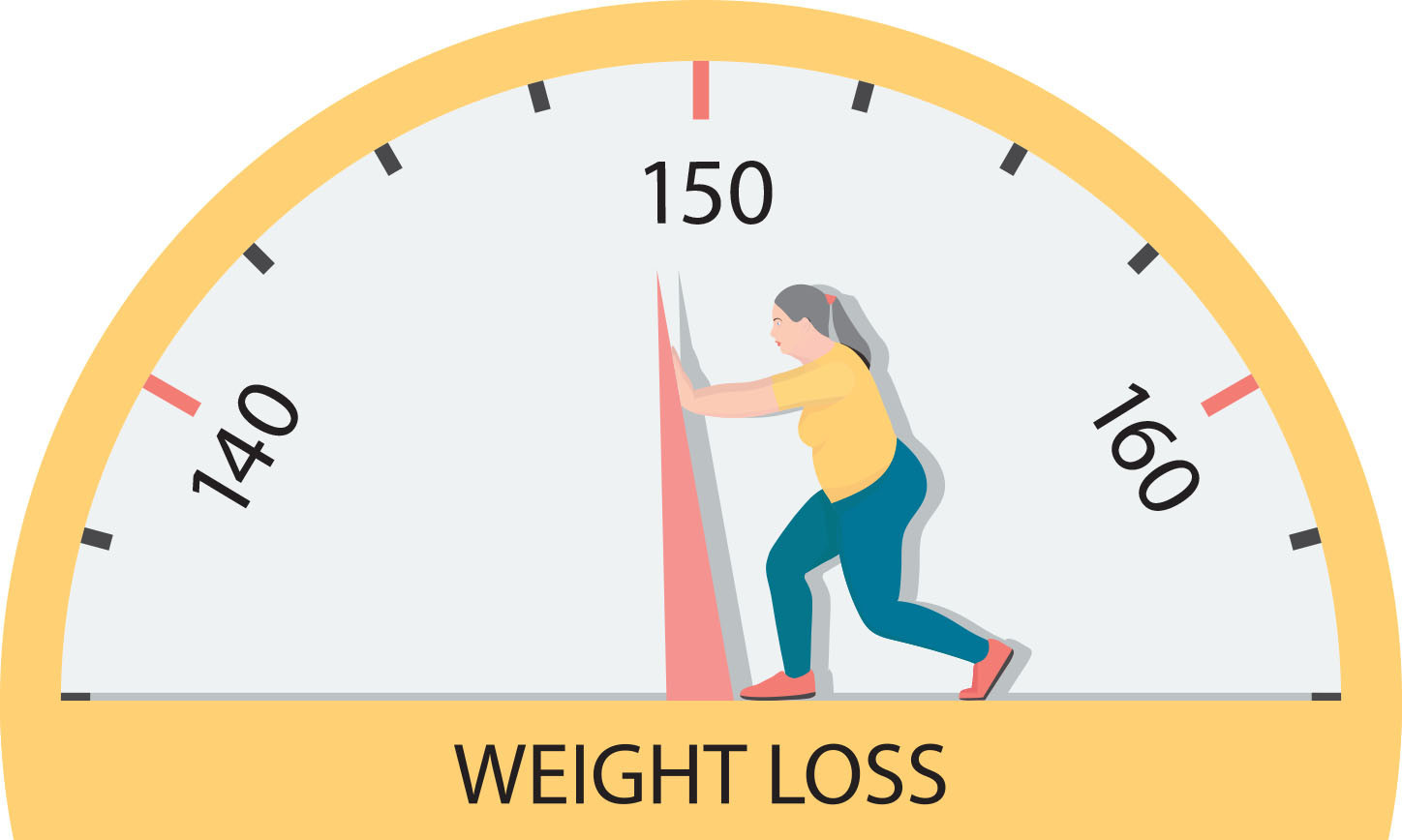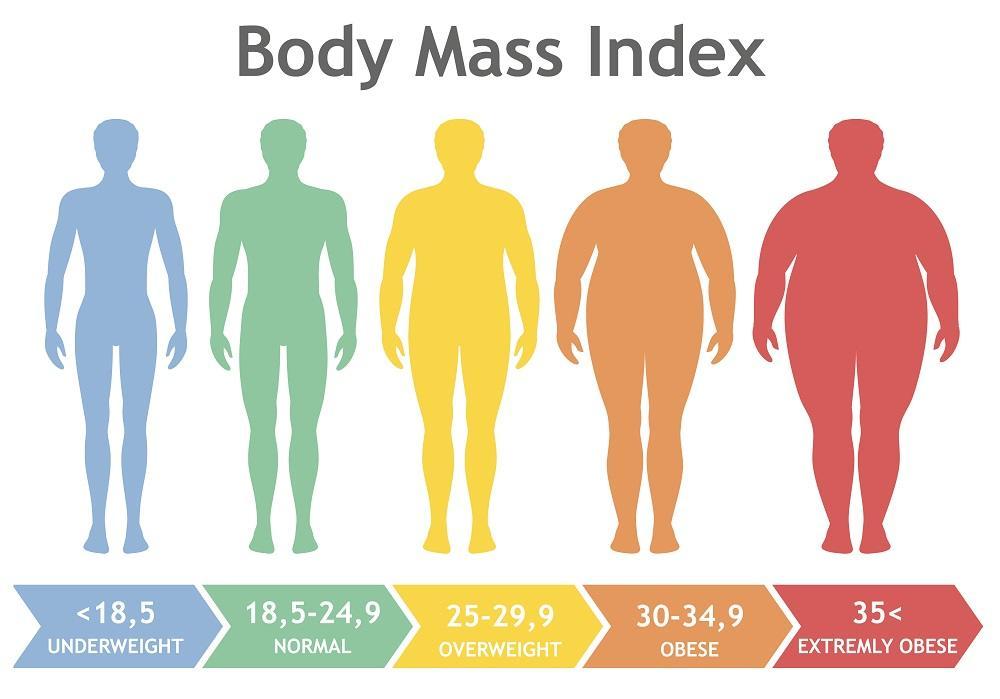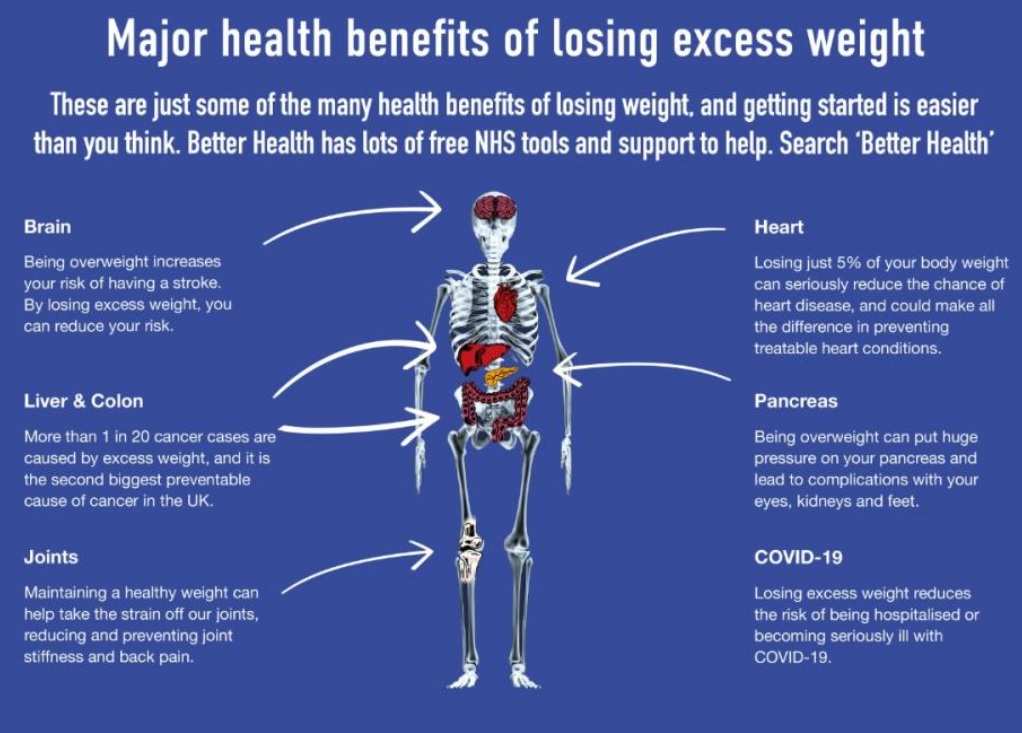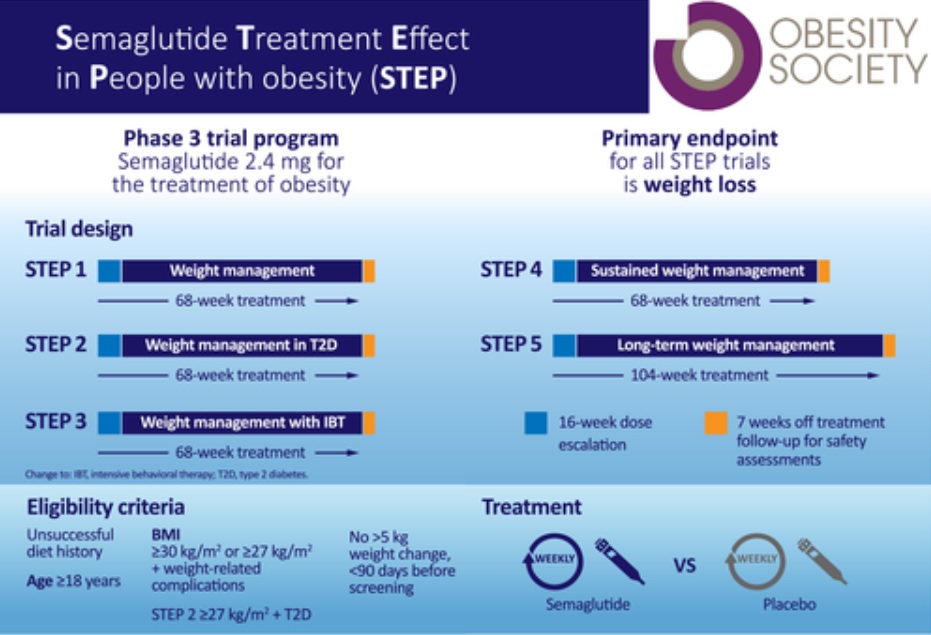Weight loss is not just about the aesthetics but the potential to reduce the risk of chronic diseases which can transform the lives of people in the long run.
While it’s essential to approach weight loss with a holistic perspective and consult with healthcare professionals, here are some common types of people who should consider weight loss for health reasons:
- Obese Individuals: Obesity is a growing global health concern that affects millions of people worldwide. It is defined by a high body mass index (BMI) which poses a great risk factor for different health conditions. Obese people often need to loose weight to reduce the risk of heart disease, type 2 diabetes, hypertension, sleep apnea, and joint problems.
- Overweight Individuals: Even individuals with a BMI in the overweight range can experience health benefits from losing weight. Weight loss can help improve blood pressure, cholesterol levels, and insulin sensitivity.
- Individuals with Obesity-Related Conditions: Anyone with conditions directly linked to obesity, such as type 2 diabetes, should consider weight loss as an integral part of their treatment plan. Weight loss can help manage and even reverse some of these conditions.
- People with Heart Disease: Excess body weight can strain the cardiovascular system, increasing the risk of heart disease and related complications. Weight loss can help reduce this risk and improve heart health.
- Hypertensive Individuals: High blood pressure is a common health concern, and weight loss can be an effective non-pharmacological intervention to lower blood pressure and reduce the need for medication.
- People with Sleep Apnea: Sleep apnea is often associated with obesity and can be exacerbated by excess weight. Weight loss can lead to significant improvements in sleep quality and the reduction or elimination of sleep apnea symptoms.
- Women with Polycystic Ovary Syndrome (PCOS): Weight loss can help regulate hormones and improve fertility in women with PCOS.
- People with Non-Alcoholic Fatty Liver Disease (NAFLD): NAFLD is closely linked to obesity. Weight loss can reduce fat accumulation in the liver and improve liver health.
- Cancer Survivors: Some cancer survivors may need to lose weight to reduce the risk of cancer recurrence and improve overall health. Weight loss can also help manage cancer treatment-related side effects.

Understanding BMI
BMI, or Body Mass Index, is a numerical value derived from an individual’s height and weight. It is a widely used tool to assess whether a person’s weight falls within a healthy range for their height and is commonly employed to screen for potential health risks related to weight.
The Formula for Calculating BMI is as follows:
Weight (kg) / [height (m)]²
Or
[weight (kg) / height (cm) / height (cm)] x 10,000
Once you calculate your BMI, the result can be categorized into different ranges:
- Underweight: BMI less than 18.5
- Normal weight: BMI between 18.5 and 24.9
- Overweight: BMI between 25 and 29.9
- Obesity (Class 1): BMI between 30 and 34.9
- Obesity (Class 2): BMI between 35 and 39.9
- Severe Obesity (Class 3): BMI of 40 or greater
It’s important to note that while BMI is a valuable tool for assessing weight-related health risks on a population level, it has limitations. For instance, it doesn’t take into account factors like muscle mass, body composition, or distribution of fat, which can vary widely among people. As a result, two people with the same BMI may have different health profiles.
Therefore, BMI should be used as a screening tool rather than a definitive diagnostic measure. A healthcare provider may consider other factors, such as waist circumference, medical history, and overall health when assessing an individual’s health status.

Health Benefits of Weight Loss
Losing weight is a goal that many individuals pursue for various reasons, and the motivations for weight loss can be highly personal and diverse. Here are some common reasons why people choose to lose weight:
- Improved Health: One of the primary reasons for weight loss is to improve overall health. Excess weight is associated with an increased risk of chronic conditions such as heart disease, type 2 diabetes, hypertension, certain cancers, and more. Weight loss can help reduce these risks and improve health outcomes.
- Disease Prevention: For individuals with pre-existing health conditions, weight loss can serve as a preventive measure. It may help manage or reduce the severity of conditions like diabetes, high blood pressure, or fatty liver disease.
- Enhanced Mobility: Carrying excess weight can lead to joint pain and reduced mobility. Weight loss can alleviate joint stress, increase mobility, and improve the ability to engage in physical activities.
- Improved Fitness: Weight loss often results in improved cardiovascular fitness, stamina, and physical performance. It can enhance exercise tolerance and make physical activities more enjoyable.
- Better Blood Sugar Control: Weight loss can enhance insulin sensitivity and contribute to better blood sugar control. This is particularly important for individuals with diabetes or those at risk of developing the condition.
- Mental Well-Being: Achieving weight loss goals can boost self-esteem, body confidence, and overall mental well-being. It may also reduce symptoms of depression and anxiety.
- Longevity: Studies have shown that weight loss, even in modest amounts, is associated with an increased life expectancy and a reduced risk of premature mortality.
- Personal Goals: Some individuals pursue weight loss as a personal goal or challenge. Achieving and maintaining a healthy weight can be a source of pride and accomplishment.
- Fertility and Reproductive Health: Weight loss can improve hormonal balance and fertility in individuals with conditions such as polycystic ovary syndrome (PCOS). It may also enhance reproductive health.

Shedding the Extra Pounds
- The primary approach to address obesity typically involves an intensive lifestyle intervention, which encompasses physical activity, dietary adjustments, and behavior counseling.
- While achieving weight loss is often linked to significant health advantages, research indicates that successfully reducing and maintaining 5% of one’s initial weight through behavioral interventions alone can pose challenges.
- In the context of long-term weight management, the FDA in the United States has authorized several medications, including semaglutide.
What is Semaglutide?
- Semaglutide is a medication that was originally developed for the treatment of type 2 diabetes. It belongs to a class of drugs called glucagon-like peptide-1 receptor agonists (GLP-1 RAs), which are designed to mimic the action of a hormone called GLP-1.
- GLP-1 is naturally produced in the body and plays a role in regulating blood sugar levels and appetite. It diminishes hunger, triggers feelings of fullness, and lowers spontaneous calorie consumption.
- In recent years, semaglutide has gained attention for its potential as a treatment for weight loss and obesity.
- When used at a higher dose than typically prescribed for diabetes management, semaglutide shows significant weight loss in individuals with obesity or overweight who also have certain health risks.
Here are some key points about semaglutide for weight loss:
- Mechanism of Action: Semaglutide works by increasing the release of insulin, reducing the secretion of glucagon (a hormone that raises blood sugar), and slowing down gastric emptying. These actions help lower blood sugar levels and reduce appetite.
- FDA Approval: In June 2021, the U.S. Food and Drug Administration (FDA) approved a higher-dose version of semaglutide (branded as Wegovy) for chronic weight management in adults with obesity or overweight and at least one weight-related health condition.
- Dosing: Semaglutide for weight loss is typically administered as a subcutaneous injection once a week. It should be taken once a week on a consistent day and can be taken with or without food. To prevent gastrointestinal side effects, the dosage is gradually increased, beginning at 0.25 mg per week, and then raised every four weeks until the full dose of 2.4 mg is achieved.
- Weight Loss Benefits: Clinical trials have demonstrated that semaglutide can lead to significant weight loss, with some individuals losing more than 15% of their initial body weight throughout treatment.
- Health Benefits: In addition to weight loss, semaglutide has been associated with improvements in various health markers, such as blood pressure, cholesterol levels, and glycemic control.
It’s important to note that semaglutide for weight loss is intended for individuals who have a BMI (Body Mass Index) of 30 or greater or a BMI of 27 or greater with at least one weight-related health condition. It is typically prescribed as part of a comprehensive weight management program that includes dietary changes, increased physical activity, and medical supervision.
If you are interested in semaglutide for weight loss or have concerns about your weight, it’s essential to consult with a healthcare provider who can evaluate your circumstances and discuss the potential benefits and risks of treatment.

A Study: Weight Loss Efficacy of Semaglutide
- In a 68-week study, 1961 adults who did not have type 1 or 2 diabetes were randomly divided into two groups in a 2:1 ratio.
- One group received subcutaneous semaglutide once a week, while the other received a placebo that looked identical.
- Semaglutide was introduced gradually, following the earlier mentioned protocol, so that participants reached the 2.4 mg dose by the end of week 16. By the end of week 68, participants who received semaglutide had lost an average of 14.9% of their initial weight, in contrast to the 2.4% weight loss observed in the placebo group.
- STEP 2 was a 68-week trial with 1210 adults who had both type 2 diabetes and were overweight or obese. They were divided into three groups; with one group receiving once-weekly semaglutide 2.4 mg, another group receiving semaglutide 1.0 mg, and the third group receiving a placebo.
- By the end of the 68 weeks, those in the semaglutide 2.4 mg group, the semaglutide 1.0 mg group, and the placebo group had lost an average of 9.6%, 7.0%, and 3.4% of their initial body weight, respectively.
- This demonstrates that the 2.4 mg dose significantly enhanced weight loss compared to the 1.0 mg dose. Additionally, those who received semaglutide 2.4 mg had substantial improvements in HbA1c, systolic and diastolic blood pressure, and other cardiometabolic risk factors when compared to those who received the placebo.

Who Should Take Semaglutide?
Semaglutide for weight loss is typically prescribed for people who meet specific criteria and have a medical need for weight management. The decision to prescribe semaglutide should be made by a healthcare provider based on an individual’s health profile and risk factors. Here are some general guidelines for who may be considered suitable candidates for semaglutide for weight loss:
- BMI Criteria: Semaglutide is often prescribed to individuals with a Body Mass Index (BMI) of 30 or greater. It may also be considered for individuals with a BMI of 27 or greater who have at least one weight-related health condition, such as type 2 diabetes, high blood pressure, or high cholesterol.
- Health Risks: Candidates for semaglutide should have specific health risks associated with obesity or excess weight. These risks may include cardiovascular disease, type 2 diabetes, sleep apnea, fatty liver disease, or joint pain, among others.
- Medical Supervision: Semaglutide treatment should be carried out under the supervision of a healthcare provider with experience in weight management. Regular monitoring and adjustments to the treatment plan may be necessary.
- Patient Commitment: Candidates should be committed to making lifestyle changes, including adhering to a reduced-calorie diet and engaging in regular physical activity. Semaglutide is more effective when combined with these lifestyle modifications.
- Individual Assessment: The decision to prescribe semaglutide should be based on an individual assessment of the patient’s medical history, current health status, and goals for weight management.
Side Effects of Semaglutide
Semaglutide, like any medication, can have side effects. It’s important to note that not everyone will experience these side effects, and some individuals may experience them to varying degrees of severity. Common side effects of semaglutide for weight loss may include:
- Nausea and Vomiting: Nausea is one of the most common side effects reported with semaglutide. The symptoms of nausea and vomiting may occur, particularly when starting the medication, but often improve with time.
- Diarrhea and Abdominal Pain: Diarrhea is another gastrointestinal side effect that can occur while taking semaglutide. Abdominal pain may also be experienced by some people.
- Constipation: Although less common than diarrhea, some individuals may experience constipation.
- Decreased Appetite: Semaglutide can reduce appetite, which is often an intended effect to support weight loss.
- Headache: Headaches are a less common side effect.
- Hypoglycemia: While less common than with some other diabetes medications, semaglutide can lead to low blood sugar (hypoglycemia), especially when used in combination with other medications that lower blood sugar.
It’s important to inform your healthcare provider if you experience any side effects while taking semaglutide. They can guidance on managing side effects and may adjust the treatment plan if needed. It’s also crucial to follow your healthcare provider’s instructions for taking semaglutide, including the dosing schedule and any dietary or lifestyle modifications.
While side effects are possible, many individuals tolerate semaglutide well, and the benefits of weight loss and improved health outcomes may outweigh potential side effects for those who meet the criteria for its use. Always consult with your healthcare provider for personalized guidance.









